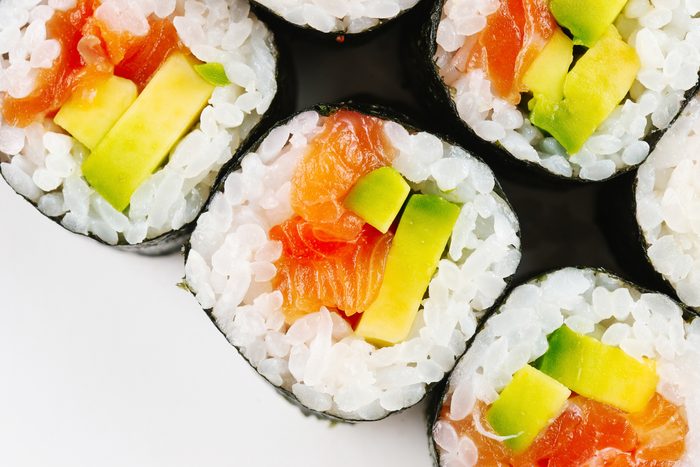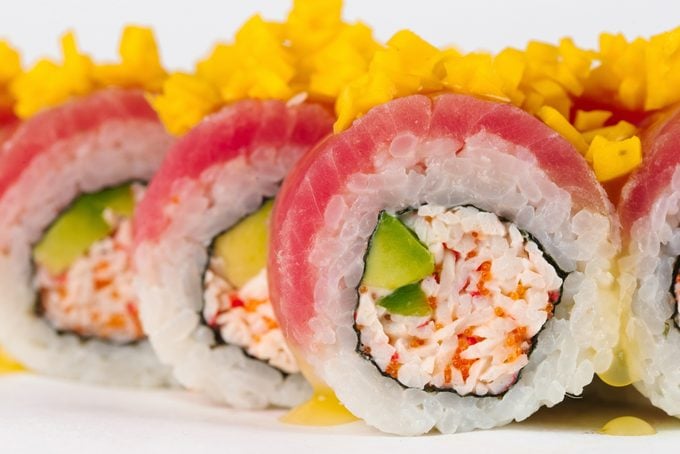I Ate Sushi Every Day for a Week—Here’s What Happened
Updated: Jul. 13, 2023

My love for sushi knows no bounds, but can too much of a good thing can sometimes be…too much? A doctor and nutrition expert explained the effects of my week-long experiment that, in the end, turned out swimmingly.
One of the most predictable conversations in my relationship is the one my partner and I have about what food we want to get for dinner each night, which almost always ends with us deciding on sushi. Although we try to branch out and eat different cuisines, sushi is one of the only things we don’t cook at home—so it feels like an extra special experience for our date nights.
Because sushi is one of my all-time favorite foods and I’ve been trying to up my salmon intake for its brain health benefits, taking on an assignment to eat sushi every day for a week seemed like the perfect chance to take inventory of how it makes my body feel (outside of the happy dance I do while eating it).
After seven filling days, here’s what I can report from my experiment of eating sushi every day for a week with insights from a registered dietitian and a licensed naturopathic doctor.
I Had Salmon Every Day for a Week—Here’s What Happened
My week of eating sushi every day
I love a crispy tempura roll as much as the next person, but I know eating fried foods too frequently does my digestive system zero favors and can make my symptoms of PCOS flare up. For that reason, I decided to switch up my sushi order. I kept my rolls as simple as possible, save for a to-die-for shrimp tempura Godzilla roll one night.
To keep my carbohydrate intake down, I opted for sashimi—thinly sliced, raw fish meat served without rice—for a few days, paired with a seaweed salad on the side. In addition to the sushi rolls and sashimi, one day I may have bento the rules (cheesy pun intended) by ordering a poke bowl while I ran errands. Considering the Hawaiian dish was filled with raw, marinated tuna and loaded with veggies and rice, I figured it was a sushi-adjacent substitute that served up a little variety.
Here’s How Many Carbohydrates You Really Need in a Day
Eating sushi every day for a week made me feel more alert
While I don’t know if this can be chalked up to the placebo effect or not, it felt as if eating sushi—or raw fish in some form—for a week improved my mental clarity and energy.
Since sushi is known to be rich in omega-3, I figured that could be possible. Erin Palinski-Wade, RD, CDCES is a New Jersey-based dietitian and the author of 2 Day Diabetes Diet. She says omega-3 fatty acids “can offer numerous benefits to overall health,” including protecting the brain. This nutrition expert adds that omega-3 fatty acids can also reducie inflammation, improve cardiovascular health, and protect the eyes.
During my week eating sushi, I felt fuller for longer
Lately, I’ve noticed I’m particularly snacky in the evening, especially when I eat an earlier dinner. Because I’ve been trying to cut down on mindless snacking, I was curious whether eating sushi would help keep me satiated enough to avoid reaching for the snack drawer at night.
The verdict: It did! I noticed when I consumed sushi rolls and nigiri (that’s the little ball of pressed rice with a slice of raw fish served over top), I was content throughout the remainder of my evening—not a tummy grumble to be felt. According to Palinski-Wade, this could be due in part to the rice vinegar that’s employed to reduce the pH level of the rice used in sushi.
Packed with antioxidants which can fight against oxidative stress, rice vinegar can also help to reduce post-meal blood sugar spikes. “Consuming vinegar with meals may help to reduce post-meal glucose levels, help reduce cholesterol levels, and increase satiety after meals, which may help to promote weight loss and maintenance,” says Palinski-Wade.
This was an unexpected win.
The 6 Best Sustainable Fish to Eat—and the 7 Worst
I was more regular during my week of eating sushi every day
While this added benefit of eating sushi every day could be considered TMI, I am nothing if not a health and wellness writer for the people. Sometimes, that includes talking about bowel movements.
After a recent vacation where I didn’t prioritize my water intake or dietary consistency, I started having issues with constipation. (Who hasn’t been there?) It was a relief when I noticed that upping my intake of sushi seemed to help alleviate my issue. I figured it was solely the fiber from the vegetables inside the sushi—but in speaking with Dr. Andrea Poy, ND, a licensed naturopathic doctor and the founder of Whole Health NWC, I learned about another component of sushi that may have helped: Seaweed. “Seaweed is rich in fiber which helps support a healthy gut microbiome and healthy hormones,” Dr. Poy says.
Seaweed helps keep digestion and metabolism in balance thanks to another attribute: “Seaweed is one of the best naturally occurring sources of iodine,” Dr. Poy explains. “Iodine is essential for healthy thyroid function because it helps create the thyroid hormones.”
5 Easy Steps to Reset Your Gut Health, Says a Doctor
Is it healthy to eat sushi every day?

Although there are many health benefits associated with eating fish, there isn’t a one-size-fits-all recommendation of how much raw fish you should eat. For some at-risk individuals, such as pregnant women or those with compromised immune systems, raw fish should be limited or avoided altogether, says Palinski-Wade.
According to the American Heart Association, it’s recommended to consume two servings of fish per week (a serving is three ounces cooked) for health benefits. And while sushi has many healthy ingredients, how healthy it is really comes down to the specifics on how it’s prepared, which can take away from its potential clean-eating benefits.
Due to my PCOS, going into this experiment I was most concerned with the increased consumption of refined carbohydrates due to the white rice that’s used in most sushi. According to Dr. Poy, refined carb intake is a major contributing factor to insulin resistance, which is the leading cause of the condition. For this reason, I was glad I varied the ways I consumed my fish over the course of the week.
Dr. Poy also noted that the type of fish incorporated in sushi can determine its nutritional benefits—or potential associated health concerns. Depending on the type of fish that’s used, sushi can also be a high source of mercury, which she says can “negatively affect thyroid, adrenal and ovarian health.” Fish known to be high in mercury include shark, ray, swordfish, barramundi, gemfish, orange roughy, ling and southern bluefin tuna, according to a guide from the National Resources Defense Council.
I Ate Tinned Fish Every Day for a Week—Here’s What Happened
How can you make sushi as healthy as possible?
While my venture into eating sushi every day was on the extreme side, it is possible to incorporate sushi—or its nutrient-packed components—into a regular diet as a well-balanced meal. As I’d expected, one way of doing this while trying to keep carb intake low is to order sashimi, which Dr. Poy suggests since it’s high in protein, as well.
In addition, here are some other ways to make sushi as healthy an option as possible, according to the experts I spoke with:
-
Use brown rice instead of white. “Brown rice is a good source of fiber, which can help you feel full and satisfied after eating,” Palinski-Wade says. “White rice is a refined grain that has been stripped of its fiber, vitamins, and minerals and digests more rapidly, which may spike blood sugar levels.”
-
Load up on veggies. For added fiber and antioxidants, she also suggests choosing rolls with vegetables like cucumber, avocado, carrots, and spinach.
-
Limit fried foods. Tempura rolls and other fried sushi dishes are high in calories and fat. Instead, opt for rolls that are made with raw or cooked fish.
-
Use condiments sparingly. If sodium is a concern, Palinski-Wade says to sparingly use sauces such as soy sauce and pickled ginger.
-
Stick with salmon. “Other ways to make sushi healthier are to choose salmon instead of other fish types, avoid rolls labeled ‘tempura’ or ‘crunchy’ and ask for sauces on the side,” says Dr. Poy. She also suggests avoiding ‘crab’ options, as they’re often made with imitation crab, which is highly processed and filled with additives.
-
Include an appetizer. To avoid overindulging in sushi, Dr. Poy suggests ordering miso soup and edamame as an appetizer, both of which are sources of phytoestrogens and fiber, which help improve hormone health.
While I’m not giving up my sushi date nights anytime soon, my week experience of eating sushi every day has allowed me to evaluate the benefits of the ingredients packed into my favorite rolls—and what I should avoid. Luckily for my health, but maybe not my wallet, sashimi it is!





















